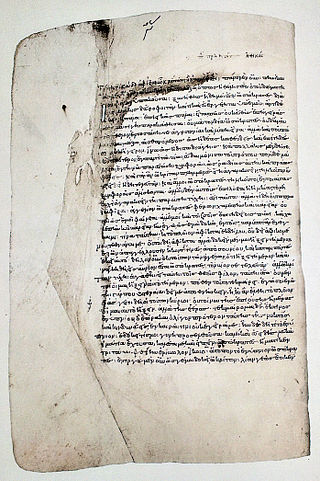Eudaimonia, sometimes anglicized as eudaemonia or eudemonia, is a Greek word literally translating to the state or condition of 'good spirit', and which is commonly translated as 'happiness' or 'welfare'.

Virtue ethics is an approach to ethics that treats the concept of moral virtue as central. Virtue ethics is usually contrasted with two other major approaches in ethics, consequentialism and deontology, which make the goodness of outcomes of an action (consequentialism) and the concept of moral duty (deontology) central. While virtue ethics does not necessarily deny the importance of goodness of states of affairs or moral duties to ethics, it emphasizes moral virtue, and sometimes other concepts, like eudaimonia, to an extent that other ethical dispositions do not.

The Nicomachean Ethics is Aristotle's best-known work on ethics: the science of the good for human life, that which is the goal or end at which all our actions aim. It consists of ten books or scrolls, and is closely related to Aristotle's Eudemian Ethics. The work plays a pre-eminent role in explaining Aristotelian ethics.

Crito is a dialogue that was written by the ancient Greek philosopher Plato. It depicts a conversation between Socrates and his wealthy friend Crito of Alopece regarding justice (δικαιοσύνη), injustice (ἀδικία), and the appropriate response to injustice after Socrates's imprisonment, which is chronicled in the Apology.
In Ancient Greek philosophy, techne is a philosophical concept that refers to making or doing. Many Ancient Greek philosophers, such as Socrates, Plato, and Aristotle, had difficulty coming up with a single definition for techne and there is differentiation between the ways that these philosophers used the term. Today the modern definition and use of the term practical knowledge is similar to the Ancient Greek definition of techne.

The designation "Renaissance philosophy" is used by historians of philosophy to refer to the thought of the period running in Europe roughly between 1400 and 1600. It therefore overlaps both with late medieval philosophy, which in the fourteenth and fifteenth centuries was influenced by notable figures such as Albert the Great, Thomas Aquinas, William of Ockham, and Marsilius of Padua, and early modern philosophy, which conventionally starts with René Descartes and his publication of the Discourse on Method in 1637.
Phronesis, is a type of wisdom or intelligence relevant to practical action in particular situations. It implies both good judgment and excellence of character and habits, and was a common topic of discussion in ancient Greek philosophy. Classical works about this topic are still influential today. In Aristotelian ethics, the concept was distinguished from other words for wisdom and intellectual virtues – such as episteme and sophia – because of its practical character. The traditional Latin translation is prudentia, which is the source of the English word "prudence". Among other proposals, Thomas McEvilley has proposed that the best translation is "mindfulness".

Socratic dialogue is a genre of literary prose developed in Greece at the turn of the fourth century BC. The earliest ones are preserved in the works of Plato and Xenophon and all involve Socrates as the protagonist. These dialogues and subsequent ones in the genre present a discussion of moral and philosophical problems between two or more individuals illustrating the application of the Socratic method. The dialogues may be either dramatic or narrative. While Socrates is often the main participant, his presence in the dialogue is not essential to the genre.
Gregory Vlastos was a preeminent scholar of ancient philosophy, and author of many works on Plato and Socrates. He transformed the analysis of classical philosophy by applying techniques of modern analytic philosophy to restate and evaluate the views of Socrates and Plato.
Aristotle first used the term ethics to name a field of study developed by his predecessors Socrates and Plato. In philosophy, ethics is the attempt to offer a rational response to the question of how humans should best live. Aristotle regarded ethics and politics as two related but separate fields of study, since ethics examines the good of the individual, while politics examines the good of the City-State, which he considered to be the best type of community.

Myles Fredric Burnyeat was an English scholar of ancient philosophy.

Michael Huemer is a professor of philosophy at the University of Colorado, Boulder. He has defended ethical intuitionism, direct realism, libertarianism, veganism, and philosophical anarchism.

Christopher James Rowe OBE is a British classical scholar. He is Professor Emeritus in the Department of Classics and Ancient History of Durham University, England, where he was Head of Department 2004–2008. He is a former President of the Classical Association, and was appointed OBE in 2009 for "services to scholarship".
Anton-Hermann Chroust was a German-American jurist, philosopher and historian, from 1946 to 1972, professor of law, philosophy, and history, at the University of Notre Dame. Chroust was best known for his 1965 bookThe Rise of the Legal Profession in America.

Michael Peter Davis is an American philosopher and educator. He is a professor of philosophy at Sarah Lawrence College.
Richard Kraut is the Charles and Emma Morrison Professor in the Humanities at Northwestern University.
Ronna C. Burger is an American philosopher and Professor of Philosophy, Catherine & Henry J. Gaisman Chair, and Sizeler Professor of Jewish Studies at Tulane University.

Plato's Phaedrus: A Defense of a Philosophic Art of Writing is a book by Ronna Burger, in which Burger provides a philosophical analysis of the Phaedrus by Plato. It has been translated into Chinese.
The bibliography of Socrates comprises works about the ancient Greek philosopher Socrates.









